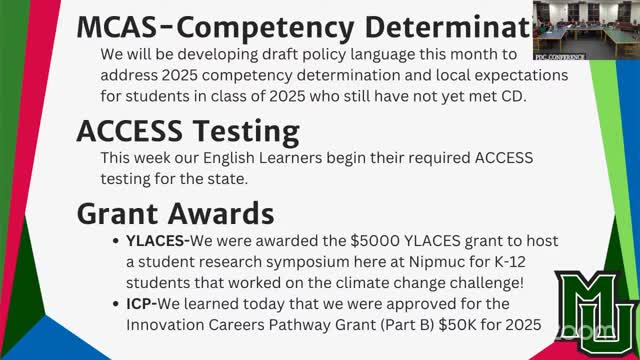District details grants, Innovation Career Pathways funding and transportation savings in FY26 budget briefing
Get AI-powered insights, summaries, and transcripts
Subscribe
Summary
District administrators reported on Jan. 6, 2025, that the Mendon‑Upton district has received multiple grants to support Innovation Career Pathways and that recent operational changes — including increased van use — have saved approximately $40,000 versus bus costs for smaller trips.
District administrators reviewed year‑to‑date grants, Innovation Career Pathways funding and how recent investments have supported student internships and off‑campus learning during the Mendon‑Upton School Committee meeting on Jan. 6, 2025.
Administrators told the committee the district received a $50,000 Part B award to support the business pathway after receiving Part A earlier; the Innovation Career Pathways program has also been supported previously with a $25,000 computer science planning grant and a $75,000 award to support computer science and business pathway development. In addition, administrators said the district received a $15,000 science pathways planning grant and other private contributions from area foundations and industry partners to support student projects and travel.
"We just learned about Part B today. That's for $50,000, and that's for our business programming," a district staff member said. The presentation listed several partners and grants: the Blackstone Valley Education Foundation and Mendon‑Upton Education Foundation, an Applied Learning Leadership Institute (Ally) partnership, and industry donors who have provided support for student research and space‑related projects.
Administrators described how grants have funded new courses, stipends, professional development and consumable equipment for Project Lead The Way and pathway classrooms. They highlighted science department partnerships that secured travel and project support — including CubeSat project participation and planned student appearances at space and climate competitions — supported by local donors and partner organizations.
On transportation and operations, staff described savings from increasing van usage for district trips. The district logged about 107 van trips since January of the prior year, and staff estimated roughly $40,000 in savings compared with using buses for those runs. Administrators said larger trips still require buses (examples included athletic trips that can cost $800–$1,600 per day) and that vans were most cost‑effective for smaller, frequent outings to community partners.
The presentation flagged several budget and program risks: potential future costs if state pathway funding is reduced, ongoing consumables for pathway classrooms currently funded by grants, and the need to budget assessments and APPLE testing if the district proceeds with K–12 adoption. Administrators recommended planning for sustainability if grant funding phases out and said future budget cycles would consider absorbing recurring costs tied to successful pilot programs.
The committee did not vote on budget adoption at the meeting; administrators said they would return with additional budget details and presentations later in the process.
